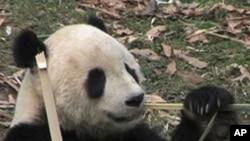One of the most popular residents at the National Zoo in Washington will be shipped to China on February 4. Tai Shan, the giant panda who became an overnight sensation when he was born at the zoo in 2005, is part of a long-term loan agreement with the Chinese government. About to reach his sexual maturity, he'll join a breeding program in China where conservationists are trying to increase the population of the endangered species.
Four and a half years ago, the National Zoo unveiled its new addition to great fanfare.
Tai Shan achieved a certain celebrity status here in the U.S. capital as visitors flocked to the zoo to see him and his parents, 10-year-old mother Mei Xiang and 11-year-old father Tian Tian, who were born in China.
Senior curator Brandie Smith says people now associate the National Zoo with giant pandas.
"In 1972, our first pandas arrived as a result of President Nixon and the relationship he built with China. Now our pandas have been with us for ten years. A lot of people come to the National Zoo, and the first animal they want to see is the giant pandas," Smith said.
But China owns all 14 giant pandas living in the United States. It loans the animals to zoos in the U.S. and other countries to raise awareness of the endangered animals, and to help scientists study them. As part of the agreement, any panda cub born in the U.S. must one day be returned to China. Smith says the program is very successful.
"I think pandas are an amazing, amazing ambassador for China - people love them, people come to see them. We've had fan clubs spring up around our pandas here because people are so fascinated with them, they want to learn about them, they want to save them," Smith said.
Conservationists say there are only about 1,600 giant pandas left in the wild. China has established over 50 panda reserves to protect the population. And so Tai will be sent to one of the large breeding programs in Sichuan province, where he'll be paired with a mate.
Judy Young is one of the many local residents who has watched Tai grow up.
"He's just a special little panda that we all enjoy being around, and get a lot of joy out of his presence," Young said.
She says she'll still come to the zoo after Tai's departure.
The zoo has been preparing for Tai's send-off, helping him get used to the crate that will be used to transport him. And scientists have artificially inseminated Tai's mother, Mei Xiang, in the hopes that she'll soon produce another panda cub for the National Zoo.




